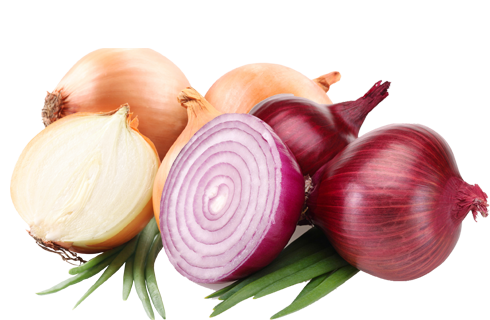
- Product name: Egyptian Onions
- Available Variety:
- Golden Onions
- Red Onions
- HS Code: 0700310
- Size : (40/60), (50/70), (70/90), (90/120)
- Package:
- 10 kg N.W Mesh Bag
- 25 kg N.W Mesh Bag
- 550 kg N.W Wooden Bin
- 1250 kg N.W Jumbo Bag
- As per client requirements.
- Availability:
- Egyptian Golden Onion- From January to June
- Egyptian Red Onion- From April to September.
- Shipping: Reefer Container
Difference of Flavor Profile between of Golden Onion and Red onion
|
Flavor Profile |
Golden Onion |
Red Onion |
|
Pungency |
Mild to Moderate |
Moderate to Strong |
|
Aroma |
Mild and Sweet |
Strong and Pungent |
|
Sweetness |
Sweeter |
Slightly Less Sweet |
|
Bitterness |
Minimal |
Slight Bitterness |
|
Allium Flavor |
Subtle |
Pronounced |
|
Mouthfeel |
Tender and Juicy |
Firm and Crisp |
|
Aftertaste |
Delicate |
Lingering and Strong |
Golden Onion
- The flavor of golden onions is milder compared to red onions. They have a subtle pungency and a mild, sweet aroma.
- Golden onions are known for their sweetness, which is more pronounced compared to red onions.
- They have minimal bitterness, providing a smoother flavor experience.
- The allium flavor, which is characteristic of onions, is present but more subtle in golden onions.
- Golden onions have a tender and juicy texture, making them suitable for various culinary applications.
Red Onion
- Red onions have a stronger and more pungent flavor profile compared to golden onions.
- The aroma of red onions is intense and pungent, often described as sharp and bold.
- While red onions are still sweet, they tend to be slightly less sweet than golden onions.
- Red onions may have a slight bitterness to their flavor, adding complexity to the taste.
- The allium flavor is pronounced in red onions, contributing to their characteristic onion taste.
- Red onions have a firm and crisp texture, making them suitable for both raw and cooked preparations.
Health benefits of Egyptian Onions
- Antioxidant and Anti-inflammatory Properties: Onions contain various antioxidants, including quercetin and sulfur compounds, that help neutralize harmful free radicals in the body. These antioxidants have anti-inflammatory properties, which may help reduce the risk of chronic diseases such as heart disease, certain cancers, and arthritis.
- Heart Health: Onions have been associated with several cardiovascular benefits. The sulfur compounds in onions may help lower blood pressure and improve blood circulation. They also help reduce the levels of "bad" LDL cholesterol, potentially decreasing the risk of heart disease and stroke. Additionally, the flavonoids in onions may help prevent the formation of blood clots.
- Immune System Support: Onions are rich in vitamin C, which is essential for a healthy immune system. Vitamin C helps stimulate the production of white blood cells, which play a vital role in fighting off infections and diseases. Including onions in your diet may help strengthen your immune system and promote overall well-being.
- Digestive Health: Onions contain dietary fiber, particularly the prebiotic fiber inulin. Prebiotics act as food for beneficial gut bacteria, promoting a healthy gut microbiome. By supporting the growth of beneficial bacteria, onions may improve digestion, reduce the risk of gastrointestinal disorders, and enhance nutrient absorption.
- Cancer Prevention: Research suggests that the sulfur compounds and antioxidants found in onions may have cancer-fighting properties. These compounds have been associated with a reduced risk of certain cancers, including stomach, colorectal, and prostate cancers. Onions also contain quercetin, which has shown potential in inhibiting the growth of cancer cells.
Nutritional Value
|
Nutrient |
Amount (per 100g) |
|
Calories |
40 kcal |
|
Carbohydrates |
9.3 grams |
|
Fiber |
1.7 grams |
|
Protein |
1.1 grams |
|
Fat |
0.1 grams |
|
Vitamin C |
7.4 mg |
|
Vitamin B6 |
0.12 mg |
|
Folate |
19 mcg |
|
Potassium |
146 mg |
|
Phosphorus |
29 mg |
* Nutritional values may vary depending on the specific brand and preparation method. It's always advisable to check the label for accurate information.
Types of Onion Cultivated in Egypt
- Giza 20: Giza 20 is a widely cultivated onion variety in Egypt. It has a yellow skin and a medium-sized bulb. Giza 20 onions have a mild to medium pungency and a slightly sweet flavor. They are versatile and can be used in various culinary preparations.
- Texas Early Grano: Texas Early Grano onions are popular in Egypt due to their early maturity. They have a yellow skin and a medium to large-sized bulb. These onions have a mild and sweet flavor, making them suitable for both raw and cooked dishes.
- Red Shallots: Red shallots are small, elongated onions with reddish-purple skin and multiple cloves. They have a milder flavor compared to regular onions and are commonly used in salads, dressings, and vinaigrettes. Red shallots are also used for pickling and adding a touch of sweetness to dishes.
- Bermuda Onions: Bermuda onions, also known as Spanish onions, are cultivated in Egypt as well. They have a pale-yellow skin and a large-sized bulb. Bermuda onions have a mild to medium pungency and are commonly used in cooking, including sautéing, grilling, and caramelizing.
- Pearl Onions: Pearl onions, also called button onions, are small-sized onions with a white or yellow skin. They have a sweet and mild flavor. Pearl onions are often used in pickling, stews, soups, and roasts, where their small size and delicate taste add a unique touch to the dish.
